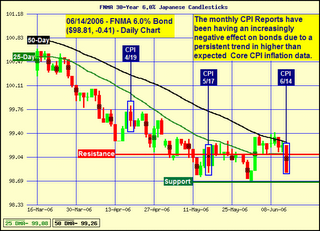How many economists does it take to hit a moving target?
The financial and economic communities are abuzz with tension right now, as the Federal Reserve is undoubtedly fine-tuning the structure of their remarks in tomorrow's policy meeting. A few weeks ago the markets were betting heavily on this meeting to be the first where the Fed did not raise rates since they began the current tightening policy in June of 2004. As I have mentioned before, the CPI numbers have been supporting the notion that inflation in the US economy is uncomfortably high. And for the last several weeks, the Fed Governors have been popping up all over the place, like a giant game of Whack-a-Mole, peppering the news with one common sentiment: Inflation persists, and is of current concern to the US Federal Reserve.
Its a different picture than a few weeks ago. This whip-saw reading on the economy is unkind to the markets, which have seen a consistent down-turn accross asset classes in the past month. Whether this is a modest correction or a trend reversal is yet to be determined. So is the economy slowing down? Is inflation still too high? The worst case would be "yes" to both.
We sit today with the markets 100% convinced that rates will be hiked tomorrow, 0.25%, to a Fed Funds rate of 5.25%. Some believe we could see a more definitive move to 5.50%. More think we will see 5.50% in August. And some think the 'terminal rate' will be as high as 6.00%.
What does this imply for our economy in the near future? As usual, there is a rainbow of opinion out there right now, ranging from healthy to worrisome. But its not the same old boom-time we have seen in recent years; current forecasts mention words like Recession, Stagflation, Asset Bubbles, etc:
- Along with the Fed, other central banks in the world are tightening, taking liquidity out of the system. The Bank of Japan has had a huge impact recently, to the tune of some $200 billion over the last few months according to George Soros. This is in the process of throwing a cold shower at the global economy.
- Commercial banking guidelines remain very liberal, but the tightening of liquidity on this level will be the likely next step, according to John Mauldin. Goodbye easy institutional money, and goodbye easy consumer money. How can we continue to spend and propel the economy at this pace?
- The folks at Northern Trust provide some discourse on the inverted yield curve, and second-guess the popular notion that 'this time it's different' with respect to the yield curve / recession correlation. Hints of the Fed going too far and causing economic damage here.
- Stephen Roach suggests that the central bankers view the recent market slowness as a correction, and are still interested in slowing the economy to a more moderate pace. Everything looks healthy; we needed this.
So lets add these ideas up a bit. Rising rates & shrinking liquidity, slowing housing markets, tightening lender guidelines... all of this has to cool off the housing market. It has to. It does not guarantee a decline, or correction in housing, but it certainly makes the idea of investing in real estate one where the risk/reward balance has shifted more in the direction of risk. The growth rate cannot be sustained, and we are seeing some hints of this in recent housing data.
It is often argued that real estate is a unique investment, in that a home both an asset, and a place to live. I support this concept, and believe that especially in the long-term view, you cannot go wrong. The media has been talking "Real Estate Bubble" since 2000. If you got scared off then, you missed one heck of a run...
Just some things to consider in the face of an increasingly gloomy economic outlook. Its a moving target. The next few months CPI, GDP, Employment and Housing data will all be interesting to watch, and should provide for further speculation, and hopefully some increased clarity on what comes next.





